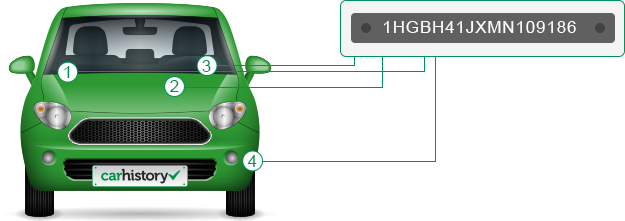
The vehicle identification number (VIN) is composed of 17 characters (digits and capital letters) that act as a unique identifier for the vehicle. A VIN displays the car's unique features, specifications and manufacturer.
The VIN can be found in a couple of places including on the car's registration label (1), on the compliance plate in the engine bay (2) or on the passenger side windshield (3), or on one of the door posts (where the door latches when it is closed) (4). See the image below:
When setting out to find your next used car, you'll have a lot to consider, from your budget to the necessary features you need for your daily life. However, apart from a navigation system, one of the factors that will strongly influence your driving experience is whether or not you opt for a 4X4, or four-wheel drive.
Not exclusive to trucks and utes, 4X4s can come in all shapes and sizes, and offer a range of capability for handling the most challenging of driving conditions.
Whether or not you choose to go for a 4X4, make sure you're making an informed decision with a CarHistory report. Inside you'll find any information you might want to know about your prospective vehicle, from past insurance claims to signs of odometer rollback and outstanding finance.
Why choose four-wheel drive over front-wheel drive?
With the majority of cars having their engines in the front, a front-wheel drive makes a lot of sense, as you don't lose power having to transfer it all the way to the back wheels (as is the case with a rear-wheel drive). Front-wheel drives are also known to be lighter and easier to manufacture, which can make them more economic both in terms of price and fuel efficiency.
"The main disadvantage is that when the vehicle is accelerated the weight of the car shifts to the rear and the front wheels tend to scrabble for grip," explains the The Royal Automobile Club of WA1.
One of the main benefits of a 4X4 is the added traction gained by power being directed to all four wheels, as well as the visibility gained with an often more elevated driving position.
Do you need a four-wheel drive?
The key attraction for this type of vehicle is their off-road capability. This is primarily due to the fact that if you should find yourself stuck on the road and you are unsure which wheels need purchase on the ground to get you moving again, a 4X4 can supply power to all four, a trait that also makes these vehicles excellent for towing.
"It is an admitted fact the large four-wheel drive is not an ideal car for driving a single person around the city," acknowledges the Australian National Four Wheel Drive Council.2
"But most 4X4 owners have other interests apart from getting to and from work during the week. The 4X4 may be an absolute necessity for that person's recreational pursuits, whether it be towing a caravan, a horse float or a large boat."2
To sum up, if you're planning on off-roading, and want the stability and ruggedness of a 4X4, go for it. However, if you're looking for a reliable city run around, perhaps a two-wheel drive will serve you perfectly fine with regards to your driving needs.
1The Royal Automobile Club of WA, 2 wheel drive Vs 4 wheel drive. Accessed July, 2015.
2National Four Wheel Drive Council, Myths and Facts. Accessed July, 2015.